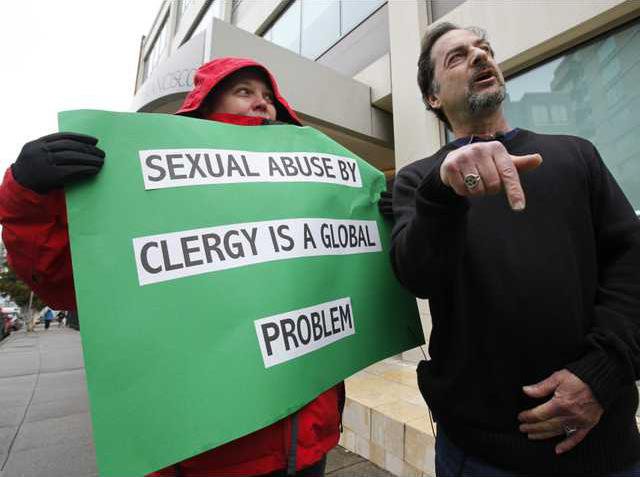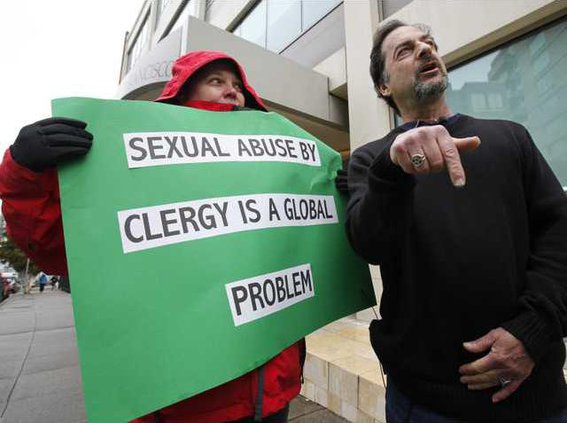VATICAN CITY - Dragged deeper than ever before into the clerical sex abuse scandal, the Vatican is launching a legal defense that the church hopes will shield the pope from a lawsuit in Kentucky seeking to have him deposed.
In court documents obtained Tuesday by The Associated Press, Vatican lawyers map out a three-pronged strategy - to be formally filed in coming weeks - seeking to dismiss the suit before Benedict XVI can be questioned or secret documents subpoenaed.
Vatican lawyers plan to argue that the pope has immunity as head of state, that American bishops who oversaw abusive priests weren't employees of the Vatican, and that a 1962 document is not the "smoking gun" that provides proof of a cover up, the documents reveal.
Three men claiming they were abused by priests brought the suit against the Holy See in 2004, accusing Rome of negligence in failing to alert police or the public about priests who molested children in Kentucky.
The preview of the legal defense, provided to the AP by a person familiar with the case, was submitted last month in the U.S. District Court in Louisville. Vatican officials declined to comment.
The case is significant because it's the first among a handful of cases targeting Rome in the United States to reach the stage of determining whether the victims actually have a claim against the Vatican itself.
Previous cases attempting to implicate the Vatican have failed or are pending at more preliminary stages.
In the Kentucky suit, the men argued that U.S. diocesan bishops were employees of the Holy See, and that Rome was therefore responsible for their alleged wrongdoing in failing to report abuse.
They charged that a 1962 Vatican document mandated that bishops not report sex abuse cases to police. The Vatican has argued that there is nothing in the document that precluded bishops from reporting pedophiles to police.
With the U.S. scandal reinvigorated by reports of abuse in Europe and scrutiny of Benedict's record as archbishop of Munich, the Kentucky case and another in Oregon have taken on greater significance, with lawyers as far away as Australia now saying they plan to go after Rome using similar strategies.
At the same time though, the hurdles remain enormously high to force a foreign government to turn over confidential documents, much less a head of state, to U.S. lawyers for scrutiny, experts say.
"They will not be able to depose the pope," said Joseph Dellapenna, a professor at Villanova University Law School an author of "Suing Foreign Governments and their Corporations."
"But lower level officials could very well be deposed and there could be subpoenas for documents as part of discovery," he said.
The victims' attorney, William McMurry, last week filed a motion in court seeking to depose the pope, Cardinal Tarcisio Bertone, currently Vatican secretary of state but for years the pope's deputy at the Congregation for the Doctrine of the Faith, Cardinal William Levada, an American who currently heads the Congregation, and Archbishop Pietro Sambi, the Vatican's nuncio in Washington.
"These are unique areas of factual discovery that cannot be obtained from any other witness on the planet," said McMurry, who represented 243 sex abuse victims that settled with the Archdiocese of Louisville in 2003 for $25.3 million.
McMurry is eager to find out what the Vatican knew and did, in particular, about Rev. Louis Miller, who was removed from the priesthood in 2004 by the late Pope John Paul II after pleading guilty in 2003 to sexually abusing one of the Kentucky defendants and other children in the 1970s. He is serving a 13-year prison sentence.
In a deposition transcription obtained by The Associated Press, Miller said he had offered to resign as early as 1962 to his then-Archbishop John Floersh, and that two subsequent archbishops knew of his crimes but continued to keep him as a priest, moving him from parish to parish.
In explaining why he wanted to resign, Miller said: "I just knew that the crime was so horrendous in my own mind that I didn't feel that I was worthy to remain a priest."
But he said Floersh was "compassionate," kept him on, and told him "You will always be a good priest."
In his current case, three men - including one allegedly abused by Miller - are named as plaintiffs. But McMurry is seeking class-action status, saying there are thousands of victims across the country.
"This case is the only case that has been ever been filed against the Vatican which has as its sole objective to hold the Vatican accountable for all the priest sex abuse ever committed in this country," he said in a phone interview. "There is no other defendant. There's no bishop, no priest."
Crucial to his lawsuit is the 1962 document "Crimen Sollicitationis," which describes how church authorities should deal procedurally with cases of abuse of children by priests, cases where sex is solicited in the confessional - a particularly heinous crime under canon law - homosexuality and bestiality.
In his lawsuit, McMurry argued the document imposed the highest level of secrecy on such matters and that it reflected a Vatican policy requiring bishops to refuse to report abuse to police.
Jeffrey Lena, the reclusive architect of the Vatican's legal strategy in the U.S., has already tried to shoot down McMurry's theory by arguing that McMurry's own expert witness, canon lawyer Thomas P. Doyle, has rejected the theories that Crimen was proof of a cover-up.
The victims, Lena wrote in a 2008 motion, "fail to offer any facts in support of their theory that Crimen caused their injuries, nor indeed any facts that Crimen was ever in the possession of the Louisville archdiocese or used in Kentucky."
McMurry insisted Tuesday that Crimen was and is a smoking gun.
"The fact is, this document and its predecessors make it an excommunicable offense to reveal any knowledge of allegations that a priest has sexually abused," he said in an e-mail.
Lena is seeking to have the court rule on the Crimen issue, and whether the bishops were Vatican employees, in hopes of having the suit dismissed before questions of deposing the pope arise.
Lena has argued that the pope cannot be questioned since he enjoys immunity as a head of state. A request to depose him by the victims' lawyers was rejected in 2007 by U.S. District Judge John Heyburn II.
The United States considers the Vatican a sovereign state - the two have had diplomatic relations since 1984 - and the pope its head of state.
Lena has argued that the pope's deposition would violate the Vatican's own laws on confidentiality, and would set a bad precedent for U.S. officials.
"If Pope Benedict XVI is ordered to testify by a U.S. court, foreign courts could feel empowered to order discovery against the president of the United States regarding, for example, such issues as CIA renditions," Lena wrote in a 2008 brief.
In 2008, the 6th U.S. Circuit Court of Appeals gave the go-ahead for his Vatican suit to continue, ruling that an exception to sovereign immunity, which shields most foreign governments from U.S. lawsuits, should be applied.

